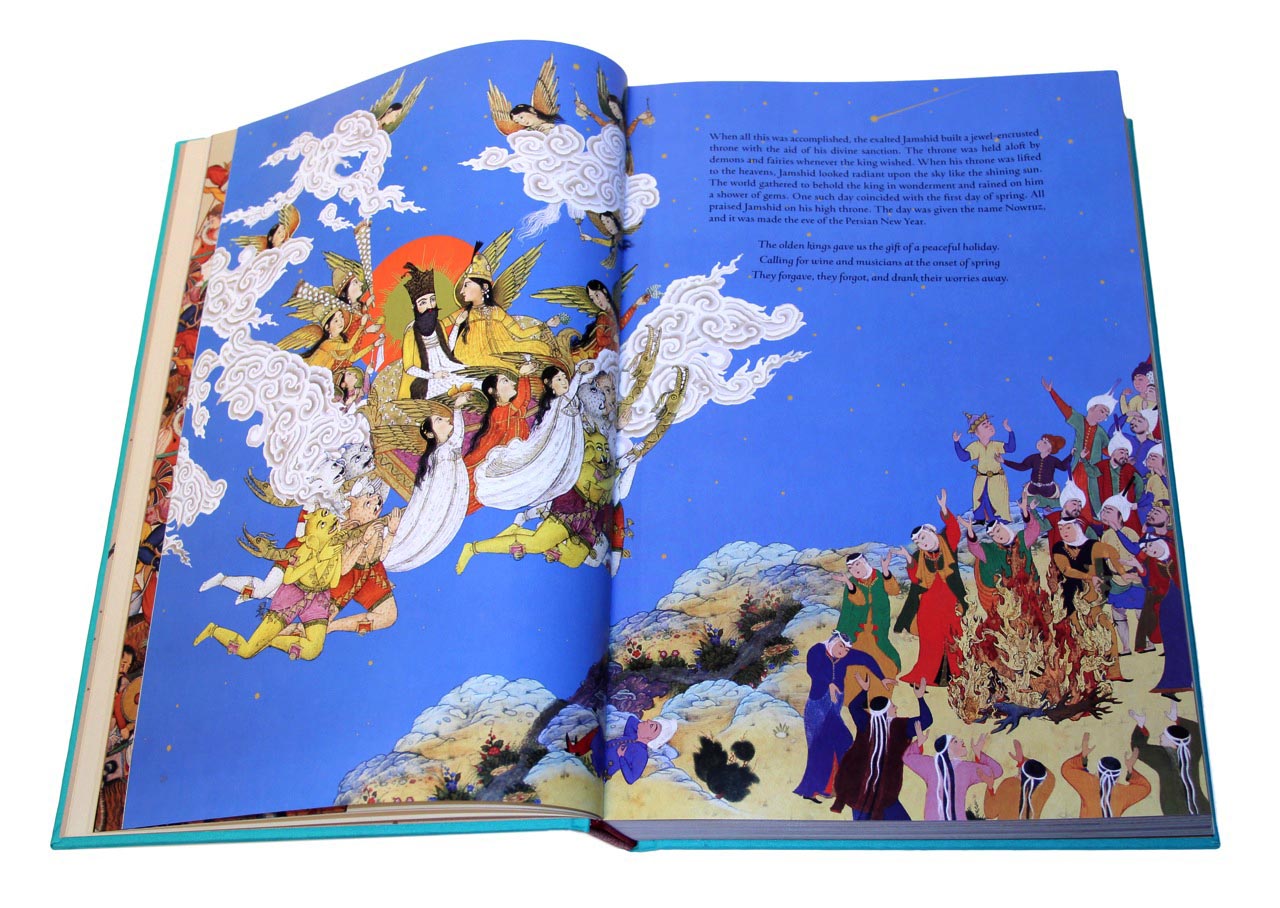Shahnameh: The Epic of the Persian Kings
By Abolqasem Ferdowsi
Art and production by Hamid Rahmanian | Translated by Ahmad Sadri
Eleventh-century Persian poet Abolqasem Ferdowsi devoted more than thirty years to crafting the Shahnameh, or Book of Kings. Since its appearance over a thousand years ago, it has come to be considered Iran’s national epic, its more than 50,000 couplets telling the story of creation and chronicling the legends and kings, the heroes and quests and mythical creatures, at the heart of Persian mythology. Ahmad Sadri’s prose translation of the Shahnameh into English is illuminated by award-winning artist and filmmaker Hamid Rahmanian’s over 500 pages of illustrations, opening the world of the Persian empire kings to new audiences across the globe.
Persian Mythology for the Modern World
After more than 10,000 hours and over three years of work, Sadri and Rahmanian’s adaptation of the Book of Kings was first published in 2013. Currently in its 7th printing, its lush and intricate illustrations incorporate images from the pictorial traditions of the Persianate world from the fourteenth through the nineteenth centuries. Sadri’s new English translation and adaptation of the Shahnameh presents the mythological and legendary stories of the original poem in accessible, fresh prose. As Sadri told CNN, he knew today’s film-savvy audiences would be no strangers to the types of stories found in the Book of Kings—but that they needed to hear those stories in language that was familiar to them. This contemporary English rendition of the epic of the Persian kings is an extraordinary literary and artistic accomplishment.
What the critics are saying…
One of the most beautiful books I've ever been given. -- Neil Gaiman
An Iranian epic for the masses — CNN International
A gorgeous new translation of the Persian epic. — NPR, All Thing Considered
A Persian Masterpiece, Still Relevant Today. — The Wall Street Journal
Simply breathtaking. — Huffington Post
Brings new, vivid life to the epic tales of the ancient Persian kings. — The Atlantic
Bringing the Epic of the Persian Kings to Life
How do you illustrate a work that’s longer than The Iliad and The Odyssey put together? In many ways, Hamid Rahmanian thinks of the task as a visual version of a DJ collecting sounds and samples to mix. And as Rahmanian tells NPR, while approaching this multilayered epic, he was also inspired by the way Persian miniaturists worked together to complete a piece of art. It was only after researching and collecting centuries’ worth of images, both online and in print, that Rahmanian then brought together the visual elements that would go into Shahnameh: The Epic of the Persian Kings.
Our Team
HAMID RAHMANIAN – PROJECT CREATOR, ILLUSTRATOR, DESIGNER
Hamid Rahmanian is an award-winning filmmaker and graphic artist whose work has been exhibited in international competitions and publications. His narrative and documentary films have premiered at Venice, Sundance, Toronto, Tribeca, and IDFA film festivals. He has won numerous international awards and his works have been televised on international networks, including PBS, Sundance Channel, IFC, Channel 4, BBC, DR2, and Al Jazeera. He lives in Brooklyn, New York.
DR. AHMAD SADRI, TRANSLATION AND ADAPTATION
Ahmad Sadri is professor of Sociology and Anthropology and James P. Gorter Chair of Islamic World Studies at Lake Forest College. He is the author of Max Weber’s Sociology of Intellectuals published by Oxford University Press and selected as the 1993 academic book of the year by Choice, the publication of American Library Association. He has written two books in Persian, Reviving the Concept of Civilizations and An Apocalypse Soon, and his published translations include Saddam City (from Arabic) and Reason, Freedom and Democracy in Islam (from Persian). He lives in Gurnee, Illinois.
MELISSA HIBBARD, EDITORIAL DIRECTOR
Melissa Hibbard is an independent writer and producer. Her latest film, THE GLASS HOUSE (2008), produced in association with the Sundance Channel received several awards including the prestigious Human Rights Award (OSCE). Her films have been well received by critics and audiences and have been part of Sundance, Tribeca, Venice, IDFA and Toronto film festivals and been broadcast on international networks around the world. She lives in Brooklyn New York.
SHEILA CANBY, FOREWORD
Sheila Canby is the Curator in Charge of the Islamic Art Department at the Metropolitan Museum of Art. Previously she was Curator of Islamic Collections at the British Museum. Her publications include Persian Painting and The Golden Age of Persian Art. She lives in New York City.
JIM MAIRS, PUBLISHER – QUANTUCK LANE PRESS
Jim Mairs has been an editor at Norton for over forty years. The critically acclaimed RED BOOK of Carl Jung is one of his recent accomplishments. Ten years ago he started his own company, The Quantuck Lane Press, where he specializes in beautifully produced books on art and other imaginative subjects.
Want to see what 10,000 hours of work looks like? Flip through the book with this fast speed tour from end to end..
Learn more about the painstaking process of creating the artwork in these interviews with creator and illustrator, Hamid Rahmanian.
The Production of this book was made possible
with the generous support of the following individuals:
Hamid Shafipour & Fereshteh Amin
Mark Amin
Ali and Mojgan Amin
Michael and Shirin Amin
Farshid and Guila Zanjani
Farhad Mohit
Farhad Shamtoub
Saeed and Samira Amidi
Farid and Afsaneh
And with the support of the following organizations: Aeen e Iran, Los Angeles, The Bijan and Soraya Amin Foundation, American Institute of Iranian Studies, Rattapallax, B.T. Manufacturing, Inc., Primex International, World, Unity Organization, Zero 1 Derfurl Trust
Additional support was provided by Nosrat Raji Amin, Kourosh Aframian, Marjaneh Halati, Farrokh Abolfathi, Mahmoud G. Farahani, Khashayar Hadipour & Negar Tabandeh, Ali Reza Vatankhah & Farzaneh Amin, Ladan Behnia, Leon & Firoozeh J. Neman, Kayhan S. Shakib, Nahid Salim, David Mesri, Ruben Abrams, Albert Hakimi, Celeste Vardaman, Stephanie Mc Andrew, Kourosh Aframian, Cyrus Milani, Mahmoud R. Fakhimi & Parvin J. Nazeri, Josiane Cohanim, Mr. David O. Moore and Amy W. Moore, Mojgan Tamaddon, Sarvenaz Angha, Hashem Hashemian, Dr. Guita Balakhane, and Zahid Atashzay.













